Artificial intelligence (AI) is everywhere—writing essays, diagnosing illnesses, even deciding what ads you see while scrolling social media. But here’s the big question: Can AI make us wiser? Sure, AI can crunch numbers and find patterns faster than we can binge a Netflix series, but does that mean it can teach us how to live better, make ethical decisions, or understand the meaning of life? Or are we giving too much credit to machines that still can’t reliably differentiate between a cat and a loaf of bread?
Let’s explore the role of AI and wisdom, the ethical conundrums it creates, and whether technology can help us navigate life’s messy complexities—all with a bit of humor to keep things light.
What Even Is Wisdom? And Can AI Hack It?
Let’s clarify: wisdom isn’t just being smart or knowing trivia. It’s the ability to apply knowledge thoughtfully—balancing facts, emotions, and morality to make good decisions for you, others, and the world.
AI, on the other hand, is good at solving problems within a framework. You feed it data, and it spits out solutions. But wisdom often involves things AI can’t touch: human experience, nuance, and that gut feeling you get when you know eating gas station sushi is a bad idea, even if it’s technically food.
Can AI Could Help Us Be Wiser
- Turning Data Overload into Insight
AI can analyze oceans of information and distill it into clear takeaways, saving us from drowning in the flood of modern life. For example, apps like Khan Academy use AI to personalize learning, helping students focus on their unique needs. But will they teach why the Pythagorean theorem matters, or how to use it to solve a real-life problem? Probably not. - Helping Us Understand Ourselves
AI-powered mental health apps like Woebot are already helping people manage emotions, guiding users toward better self-awareness. But while these tools can mimic empathy, they’re still glorified algorithms. They’re great for reminding you to breathe during a panic attack, but they’ll never hug, cry, or tell you, “It’s going to be OK.” (And honestly, would you want a robot trying to give you a heartfelt hug?) - Assisting with Ethical Decision-Making
AI is used in medicine and law to help professionals make life-and-death decisions. It can crunch probabilities, suggest options, and reduce bias. But here’s the catch: AI doesn’t feel anything. It doesn’t know what it’s like to hold someone’s hand and deliver hard news or to balance personal ethics against professional duty. In short, it’s a great assistant but a terrible CEO.
The Limits of AI When It Comes to Wisdom
AI has its strengths, but let’s not crown it the Buddha of the Digital Age just yet:
- Wisdom Requires Context
Sure, AI can analyze data, but it doesn’t understand the messy, human stuff—like how a simple “I’m fine” text from your partner could mean anything from “I’m fine” to “I’m furious and plotting revenge.” Wisdom involves navigating ambiguity, which is not AI’s strong suit. - Ethical Blind Spots
AI reflects the biases of its creators. If programmers miss something—or train the algorithm on biased data—AI can make decisions that are, well, stupid. For example, facial recognition software has had serious accuracy issues across racial groups. That’s not wisdom; that’s a lawsuit waiting to happen. - AI Lacks Soul
Wisdom often comes from life experience, emotional depth, or staring at the stars, wondering what it all means. AI doesn’t have those moments. It doesn’t gaze at sunsets or fall in love (yet), so it can’t inspire us to do the same.
Ethics: The Fine Line Between Tool and Tyrant
AI raises some serious ethical questions, like:
- Who’s programming it? Wisdom varies across cultures, so how do we ensure AI reflects diverse perspectives and doesn’t reinforce harmful stereotypes?
- Should AI make decisions for us? Let’s face it: wisdom is about responsibility. Machines can help, but they shouldn’t take over.
- Are we losing our humanity to convenience? Over-relying on AI could make us lazy, like those people who refuse to memorize phone numbers because Siri will do it for them.
So… Can AI Make Us Wiser?
In short, no. But it can help us become wiser if we use it correctly. Think of AI as a brilliant assistant—not a life coach, philosopher, or your mom. It can sort through massive amounts of information, offer new perspectives, and even nudge us toward better self-awareness, but at the end of the day, we are responsible for wisdom. Machines can’t feel, reflect, or ask, “What’s the greater good here?”—but we can.
A Wise Future: Humans + Machines
The key to wisdom in a tech-driven world is balance. Use AI to make your life easier, to process information faster, to expand your understanding of the world. But never forget that wisdom requires human connection, empathy, and experience. Wisdom isn’t a download; it’s a journey. AI can help pave the path, but only you can walk it.
And hey, if we ever invent an AI that does have wisdom? Let’s just hope it doesn’t spend its time lecturing us about our Netflix choices.
Final Takeaway
AI isn’t here to replace wisdom but to enhance it. But the heart of wisdom will always be human. So the next time you ask Alexa for advice, remember: she might know the weather but has no idea how to help you navigate your soul. That’s on you.

